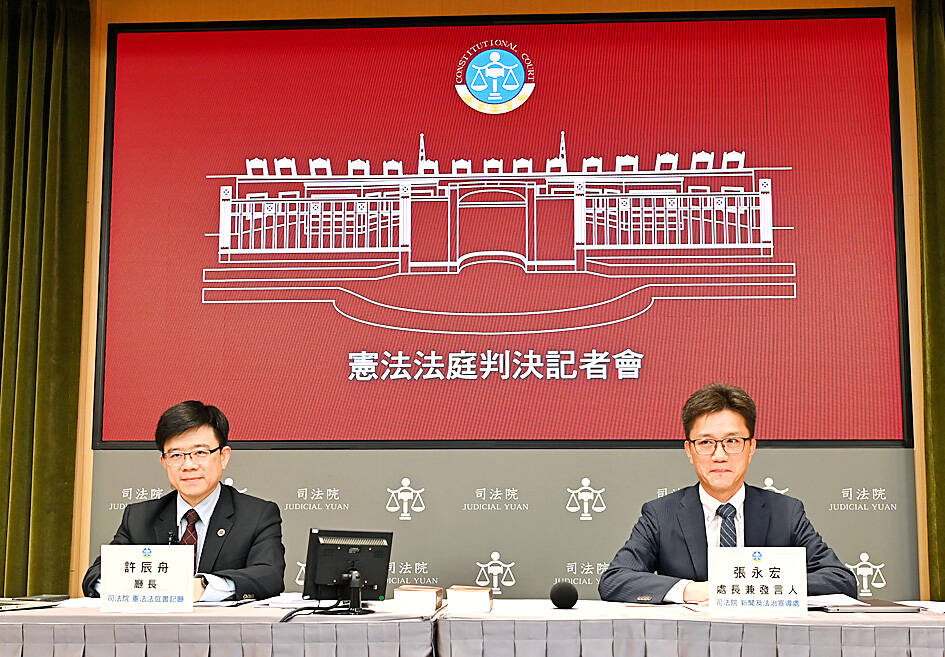The Constitutional Court yesterday ruled against decriminalizing defamation, but narrowed the scope of the crime to intentionally making a false statement and displaying gross negligence in verifying a statement’s truthfulness before dissemination.
Disseminating a false statement cannot be considered libel or slander if there was a reasonable effort to verify its truthfulness, the court’s abstract for Constitutional Judgement No. 8, 2023, says.
This means that the burden is on prosecutors to prove intent or negligence on the part of the defendant, it said.

Photo: Wang Yi-sung, Taipei Times
Defamation is defined by the Criminal Code as a reputationally injurious statement that is false or about a matter of no concern to the public, said Judicial Yuan President Hsu Tzong-li (許宗力), who also serves as the court’s presiding judge.
Information or evidence disseminated following a reasonable process of investigation and verification is exempt from defamation, even if untrue, he said.
The standard of tenability should be determined on an individual basis after weighing the right to reputation with the right to the freedom of speech, which are equally protected under the Constitution, he said.
When applied according to the above standards, the penalty for defamation does not contravene the constitutional principle of proportionality, he said, citing a precedent established by Judicial Yuan Interpretation No. 509.
The court on March 14 heard the debate for Chu Cheng-sheng (朱長生) et al versus the Judicial Yuan, which brought about the constitutional judgement.
The Judicial Yuan at the time said that the doctrine of legislative supremacy that grants precedence to the legislature’s authority to make laws over the courts should be applied to any conflict between the right to free speech and the right to reputation and privacy.
Individual liberties are sufficiently protected by the standards of actual malice and negligence established in Interpretation No. 509 and the due process of the criminal justice system, it said.
Defamation laws are widely utilized in other nations, and the right to protection against attacks on reputation needs to be upheld under current social conditions, it said.
The state has a justifiable interest to uphold democracy by punishing people who spread false statements about public matters to injure the reputation of others, National Taipei University professor of law Hsu Yu-an (徐育安) said.
The judgement, which excludes good-faith errors from punishment and targets those who intentionally spread falsehoods, is in keeping with the spirit of Interpretation No. 509 to limit state inference on speech, he said.
However, Hsu Chia-shin (許家馨), an assistant research fellow at Academia Sinica’s Institutum Iurisprudentiae, said that empirical evidence has shown that Interpretation No. 509’s definition of reasonableness is not clear to law practitioners.
The knowledge of falsehood or willful blindness toward it should be the defining element of criminal defamation, she said.
Interpretation No. 509 needs to be expanded to reconcile different opinions about the standard for the crime of defamation, National Human Rights Commission member Kao Yung-cheng (高涌誠) said.

The Ministry of the Interior (MOI) is to tighten rules for candidates running for public office, requiring them to declare that they do not hold a Chinese household registration or passport, and that they possess no other foreign citizenship. The requirement was set out in a draft amendment to the Enforcement Rules of the Public Officials Election and Recall Act (公職人員選舉罷免法 ) released by the ministry on Thursday. Under the proposal, candidates would need to make the declaration when submitting their registration forms, which would be published in the official election bulletin. The move follows the removal of several elected officials who were

The Republic of China (ROC) is celebrating its 114th Double Ten National Day today, featuring military parades and a variety of performances and speeches in front of the Presidential Office in Taipei. The Taiwan Taiko Association opened the celebrations with a 100-drummer performance, including young percussionists. As per tradition, an air force Mirage 2000 fighter jet flew over the Presidential Office as a part of the performance. The Honor Guards of the ROC and its marching band also heralded in a military parade. Students from Taichung's Shin Min High School then followed with a colorful performance using floral imagery to represent Taiwan's alternate name

FOUR DESIGNATED AREAS: Notices were issued for live-fire exercises in waters south and northwest of Penghu, northeast of Keelung and west of Kaohsiung, they said The military is planning three major annual exercises across the army, navy and air force this month, with the navy’s “Hai Chiang” (海強, “Sea Strong”) drills running from today through Thursday, the Ministry of National Defense said yesterday. The Hai Chiang exercise, which is to take place in waters surrounding Taiwan, would feature P-3C Orion maritime patrol aircraft and S-70C anti-submarine helicopters, the ministry said, adding that the drills aim to bolster the nation’s offshore defensive capabilities. China has intensified military and psychological pressure against Taiwan, repeatedly sending warplanes and vessels into areas near the nation’s air defense identification zone and across

COVETED PRIZE: The US president would be a peace prize laureate should he persuade Xi Jinping to abandon military aggression against Taiwan, William Lai said US President Donald Trump should get the Nobel Peace Prize should he be able to convince Chinese President Xi Jinping (習近平) to abandon the use of force against Taiwan, President William Lai (賴清德) told a conservative US radio show and podcast in an interview. The US is Taiwan’s most important international backer, despite the absence of formal ties, but since Trump took office earlier this year he has not announced any new arms sales to the nation. Trump could meet Xi at the APEC summit in South Korea on Oct. 31 and Nov. 1. Lai, speaking on The Clay Travis and Buck Sexton